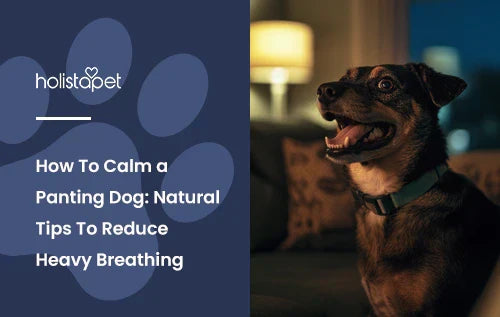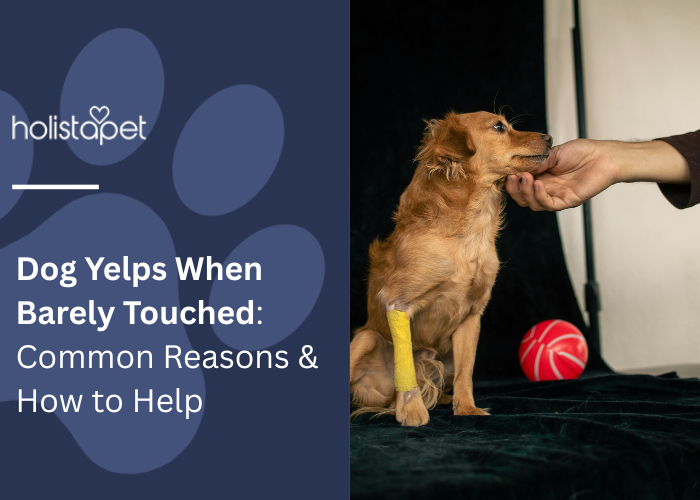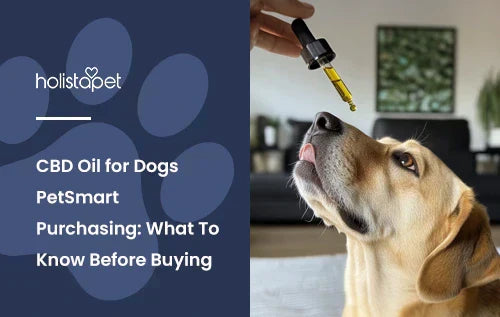You hear it: fast breathing, loud panting. And those wide eyes, you see them. That's not normal post-walk puffing. That's your cue to learn how to calm your panting dog before things spiral.
Grab some cool water, lower the room temp, and talk softly. Dogs pick up on your energy, so chill yours first. Some panting is fine, but if your buddy looks worried or restless, that's your sign to step in.
Why Do Dogs Pant? Understanding the Basics

Dogs naturally pant to cool off and regulate their body temperature. Unlike us humans, they cannot sweat. So yes, panting is part of their normal behavior, especially after a walk or on a particularly scorching day.
But if your pup is panting excessively for no clear reason, it might be more than just heat. Look out for other signs like pale gums, droopy energy, and wobbly legs.
Normal Panting vs. Excessive Panting
Panting is part of your dog's everyday life, just like tail wags and sloppy kisses. But when it turns into loud, nonstop, or labored breathing, that's a red flag. Here's a quick comparison to help spot the difference:
|
Normal Panting |
Excessive Panting |
|
After exercise or play |
Starts suddenly with no clear reason |
|
Happens in warm weather |
Happens in cool environments and shaded areas |
|
Eases after rest or water |
Keeps going even after rest |
|
Relaxed mouth and eyes |
Tense face, wide eyes, pacing |
|
Quiet or rhythmic breathing sounds |
Noisy breathing, gasping, or deep huffs |
Common Reasons for Heavy or Sudden Panting
Sometimes, dogs pant because they're hot, and that's it. Other times, they're feeling something seriously off. Either way, dog owners shouldn't ignore sudden or heavy breathing. They should know the common triggers, so they can act fast. We'll dissect these reasons more in the following sections:
- High Temperature or Overexertion
- Anxious Feelings, Excitement, or Fear
- Discomfort or Underlying Health Issues
- Reactions to Medication or Toxins
Heat and Overexertion
Dogs cool down by breathing fast, so if they're sprinting around under the sun while playing fetch, their panting kicks into overdrive. Watch for loud breathing, a low-hanging tongue, and droopy energy. Grab some cold water and get them into a shady area. Don't wait because heat and overexertion can sneak up fast on your furry friend.
Anxiety, Excitement, or Fear
Panting is also often tied to emotions. Loud noises, new faces, or a trip to the veterinarian can crank up your pup's anxious energy. When that happens, their breathing speeds up. Some dogs pant heavily when they're nervous or overly excited. If their tail is low, their ears are back, and they're glued to your side, it might not be excitement but agitation.
Pain, Discomfort, or Underlying Health Issues
Dogs can't say "ouch," so they breathe it out instead. Watch for limping, stiff movement, and tenderness when touched. Health problems like joint swelling, heart disease, and too much cortisol from Cushing's disease can mess with your pet'sbreathing. When panting pairs with other symptoms—like low energy or changes in appetite—talk to your vet for solutions.
Reactions to Medication or Toxins
Yes, medication and toxins can mess with your dog's breathing in a flash. Some pups start panting like crazy after taking certain meds or sneaking a bite of something they shouldn't. If your dog is panting hard, pacing, or acting off after a new pill or a mystery snack from the trash, call your veterinarian immediately. Fast action can make a big difference.
How To Calm a Panting Dog Safely and Gently
Your dog's breathing sounds like they just ran laps around the block, but the thing is, they've been inside all day. Time to act. A few quick moves can shift things fast:
- Move Your Dog to a Cool, Shaded Area
- Offer Fresh, Cool Water
- Speak Calmly and Reassure With Gentle Touch
- Remove or Avoid Triggers That Might Be Causing Stress
Move Your Dog to a Cool, Shaded Area
First things first: Get your dog out of the heat. Find a shady spot fast or bring them inside. Lay down a fan, open a window, or crank up the air conditioning. Even just a patch of shade or a chilly tile floor can help lower their internal temperature.
Offer Fresh, Cool Water
Thirsty pups pant harder, so grab that water bowl—stat. Cool water can help lower their body temp from the inside out. Let them sip at their own pace, and refill the bowl with clean, cold water as needed. Toss in a few ice cubes if it's a particularly hot day. Hydration helps your dog cool down and catch a deep breath.
Speak Calmly and Reassure With Gentle Touch
A soft voice and gentle petting can work wonders when your dog's breathing hard from worry or excitement. Go for low, steady tones. Stroke their back or ears if they seem comforted by touch. But if they flinch or pull away, give them space.
Remove or Avoid Triggers That Might Be Causing Stress
If your dog starts panting out of nowhere, scan the scene. Loud noises, new people, weird smells—any of these can spark anxious behaviors. Shut a door, turn off the noise, and gently lead them away. Remove the trigger, and you'll often see the panting slow down. Less stress equals gentler breathing.
Natural Calming Remedies for Panting Related to Anxiety, Fear, or Discomfort
Some panting doesn't stop with water and shade, especially if your dog feels nervous or unsettled. In these cases, natural soothing remedies can come in and help take the edge off without anything harsh. From calming chews to pet-safe scents, gentle options can support your best friend's comfort during shaky moments.
CBD Calming Chews or Oils

CBD (cannabidiol) may help settle your dog when they're anxious or feeling discomfort. These natural additions to your pet's routine may ease tense moments and promote a more relaxed demeanor.
Our CBD Dog Treats for Anxiety, CBD Calming Chews, and Broad-Spectrum CBD Oil use only the most wholesome ingredients. They're easy to give and gentle on your pup's system. Discuss with your vet, and check out HolistaPet's CBD Collection for Dogs today.
Lavender or Chamomile Aromatherapy (Pet-Safe Use Only)
Lavender and chamomile, used carefully, may help your pooch feel more at ease when they're breathing fast from nerves or fear. Just be sure you're using products made for pets. Skip the candles and sprays. Go for diffusers or diluted oils in a space your dog can leave if they want. A little whiff might calm their mind and slow that panting.
When To Worry About Your Dog’s Panting
Sometimes panting is your dog's way of yelling, "Hey! Something's not right!" If the heavy breathing doesn't stop or gets worse, it's time to stop guessing.
Watch how long it lasts, how intense it sounds, and what else is going on. If your pup looks uncomfortable or weak, don'twait it out. It's always better to call your vet than to second-guess a serious situation.
Signs That Panting May Be a Medical Emergency
Panting can flip from normal to scary real quick. If your dog's breathing feels off and you spot other red flags, it might be time for urgent care. Watch for:
- Pale or Blue Gums. This means not enough oxygen is getting through.
- Collapse or Trouble Standing. Could signal heart failure or serious health problems.
- Glassy Eyes or Confusion. Your dog may be overheating or in distress.
- Noisy or Gasping Breaths. Sounds like wheezing, choking, or struggling to breathe.
- Extreme Drooling. Can point to toxin exposure or stomach issues.
Panting With Pale Gums, Lethargy, or Collapse
If your dog is panting and their gums look pale or grayish, that's a big warning sign. Add in low energy or sudden collapse, and that's an emergency. These symptoms could mean heart disease, lung trouble, or something more serious. Your pet's breathing might look like just panting, but paired with these signs, it's time to seek veterinary care right away.
Tips To Prevent Panting Due To Stress or Heat

Want to stop the panting before it even starts? Smart move. A few simple habits can keep your pooch chill, calm, and comfy. Here's what you can do:
- Avoid Walks During Peak Heat Hours. Early mornings or evenings are much better for outdoor time.
- Use Cooling Mats or Fans in Hot Weather. These help lower body temperature quickly.
- Provide Safe Spaces for Anxious Dogs. Quiet zones give your pet a break from chaos.
- Keep Fresh Water Available All Day. Hydration is key for healthy dogs.
- Watch for Triggers and Adjust Accordingly. Know what sets your pup off, and dodge it when you can.
Avoid Walks During Peak Heat Hours
Midday sun is brutal on your dog's body. That kind of heat can send their panting into overdrive before you even hit the corner. Stick to early mornings or late evenings when the temps drop and the air feels chilly. Your dog still gets their walk but without the risk of overheating. Plus, you both avoid the sweaty meltdown.
Use Cooling Mats or Fans in Hot Weather
These tools help your dog chill out when the heat kicks up and panting won't quit. Lay a cooling mat where your pup likes to flop, or set up a fan to keep air moving. It doesn’t have to be fancy. Just give them a cool zone where they can breathe easier and relax.
Provide Safe Spaces for Anxious Dogs
Some dogs need a hideout when the world feels loud or weird. This can be a cozy corner, a crate with a blanket, or a spare room. Add a favorite toy or two for comfort. When your pup has a safe place to chill, their breathing often slows down right along with their racing thoughts.
Final Thoughts – Helping To Calm Dog Panting
Panting can mean a lot, from being overheated to being overwhelmed. But with the right steps, you can help your canine bestie breathe easier and feel better faster. Cool air, quiet spaces, and calm vibes go a long way.
If you need a little extra help, HolistaPet's natural wellness products offer gentle support when your dog's breathing feels off. Trust your instincts, watch for signs, and keep your furry friend comfy and safe.


 CBD Oil for Dogs - Fast Acting
CBD Oil for Dogs - Fast Acting
 Chicken Flavored CBD Oil For Dogs - Easy Dose
Chicken Flavored CBD Oil For Dogs - Easy Dose
 Salmon Flavored CBD Oil For Dogs - Highly Rated
Salmon Flavored CBD Oil For Dogs - Highly Rated
 CBG Oil for Dogs and Cats - Loved by Thousands
CBG Oil for Dogs and Cats - Loved by Thousands





Leave a comment
All comments are moderated before being published.
This site is protected by hCaptcha and the hCaptcha Privacy Policy and Terms of Service apply.